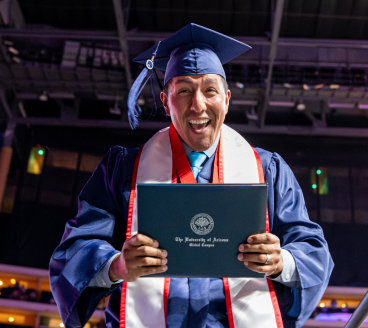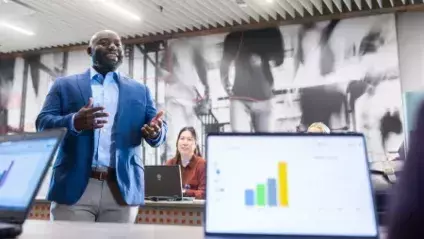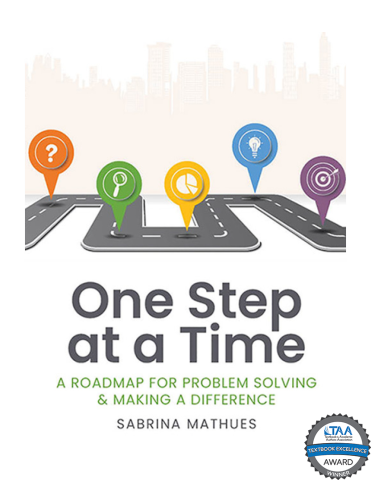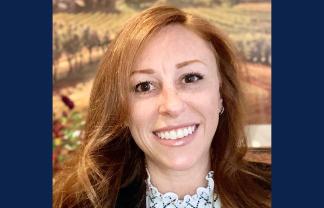Questions? Request Information
Develop Solutions for Societal Problems
Prepare to make a difference with the Bachelor of Arts in Applied Behavioral Science program from the University of Arizona Global Campus. The program provides a foundation in the social and behavioral sciences, and you’ll learn to use critical thinking to understand behavior and solve societal problems at the individual, family, and community level.
As you pursue your behavioral science degree online, you will be exposed to many interdisciplinary studies, giving you the appropriate resources to further shape how you can find solutions to society’s issues.
Upon completion of your Bachelor of Arts in Applied Behavioral Science, you will be able to:
- Analyze major concepts, theoretical perspectives, and empirical findings to solve complex problems in the field of study
- Compose effective communications in a variety of formats for assessment, evaluation, and/or intervention purposes
- Apply effective methods to assessment, evaluation, and intervention at intrapersonal and interpersonal levels
- Assess the value of empirical evidence, applying ethical practices and values, while acknowledging and respecting human diversity
- Evaluate diverse approaches that advance personal and professional development within various social constructs that promote inclusion and quality of life
UAGC Award-Winning Curriculum
Military Students $250.00/credit
Undergraduate Courses $460.00/credit
Technology Fee** $115.00/course
Books and Other Class Materials** $125.00/average per course
Graduation Fee $150.00
Total Program Cost See UAGC Catalog¹
¹Keep in mind that this figure doesn’t factor in any potential discounts, partner benefits, or impact of accepted transfer credits, if eligible.

UAGC offers enrolled students access to ScholarshipUniverse, a platform that tailors external scholarship opportunities to your unique situation, making it easier to find and apply for scholarships.
UAGC is proud to provide reduced tuition rates for our academic and corporate partners, helping community college transfer students and corporate employees earn their degrees at a lower cost.


Course Overview
To earn your Bachelor of Arts in Applied Behavioral Science at UAGC, you must complete 120 credits. You will need to complete 30 upper-division credits, of which 18 credits must be from the major program. A total of 30 credits must be completed at the University of Arizona Global Campus to meet the residency requirement. You may be able to transfer approved credits from community colleges, other previous college coursework, or other life experiences such as military service or job training toward your degree.
In this program, 12 credits from the major may also satisfy General Education requirements.
This program is not designed to meet the state educational requirements for a specific professional license or certification in any state. Students seeking licensure or certification in a particular profession shall carefully research the requirements prior to enrollment and regularly review the requirements as they are subject to change. Requirements vary by state. The University of Arizona Global Campus does not guarantee that any professional organization will accept a graduate’s application to sit for any exam for the purpose of professional certification. Further, a criminal record may prevent an applicant from obtaining licensure, certification, or employment in their field of study.
Certain degree programs may not be available in all states.
The Online Teaching Support Certification recognizes programs that require all online faculty to undergo training in best practices for online course delivery, provide faculty with ongoing pedagogical support, encourage faculty professional development to increase their knowledge and skill in online teaching, emphasize instructor availability and feedback to learners, and collect and use feedback from learners to improve online teaching. Learn More

The Online Learner Support Certification recognizes programs that provide all the critical student and academic services needed for learner success and use learner feedback to continuously improve those services.

What Can I Do with a Degree in Applied Behavioral Science?
Here are just a few of the many career paths and industries in which a Bachelor of Arts in Applied Behavioral Science degree could be relevant:
- Advocate
- Social and Human Service Assistants
- Social and Community Service Managers
- Family Resource Coordinator
- Youth Services Specialist
- Residential Care Assistant
- Case Manager
- Community and Social Service Specialists
- Mental Health Assistant Behavioral Health Technician
- Mental Health Aide
- Human Resources Specialists
- Probation Officers and Correctional Specialists
Graduates with a Bachelor of Arts in Applied Behavioral Science degree may choose to pursue any number of career paths in which critical thinking skills are a must, including social services, human services, and business. This degree also provides a well-rounded foundation for continued studies at the graduate level.
Gain insights into the applied behavioral science job market by reviewing the Bureau of Labor Statistics market outlook report.
The ability to work towards my degree and maintain my daily life was a huge factor in my decision to go back.
BA in Applied Behavioral Science FAQs
-
The Bachelor of Arts in Applied Behavior Science program at UAGC is designed to be a four-year program. This timeframe is based on the successful passing of each course as scheduled without taking breaks, and calculated without any transfer credits applied. With approved transfer credits and credit for work and life experience, the length of your program may be shortened.
-
A behavioral science degree joins the natural sciences and social sciences together to create a broad understanding of human behavior. With an understanding of behavioral sciences, students can begin to understand why people behave in a certain way, as well as address problems that may impact families, organizations, communities, and even society in general.
The degree program from UAGC provides opportunities for you to apply your knowledge to multiple disciplines, as behavioral science is relevant in psychology, sociology, law, criminal justice, human services, business, and ethics. In essence, a behavioral science degree covers the broad interdisciplinary field that looks at each of these areas and how they influence human behavior.
-
To be as successful as possible in your program, you’ll need basic computer skills, reliable internet access, and a compatible device (laptop or desktop computer). Details on technology requirements can be found in the UAGC Academic Catalog. As a UAGC student, you’ll have 24/7 support if you run into any technical difficulties.
-
According to U.S. News & World Report, the increasing quality and accessibility of online education have significantly reduced the stigma associated with online degrees. Many employers now recognize the value of online programs, especially from accredited universities like UAGC.
See What Else UAGC Has to Offer
Questions? Request More Information
To access this rate using the Liberty Grant, only eligible undergraduate active duty service members, members of the National Guard, Reservists, spouses of active duty, members of the National Guard and Reservists, Department of Defense employees using Tuition Assistance (TA), and civilian employees of the United States Coast Guard (only if utilizing Military Tuition Assistance) will qualify.
**
The Technology Fee covers access to University systems such as the online classroom, the Student Portal, and other academic resources. The Technology Fee and the Course Digital Materials (CDM) Fee are fully refundable if a student does not attend beyond Day 3 of a course (Week 3 if covered under the University of Arizona Global Campus Promise Refund Schedule). After this time, the fee becomes non-refundable. Students are charged the Technology Fee for repeated coursework. Students are not charged the CDM fee for repeated coursework if previously charged.
†
The transferability of credits is subject to the University of Arizona Global Campus transfer credit policies and requires the submission of official transcripts. The official transcripts will be evaluated by the Registrar’s Office to determine the credits that will officially apply toward a UAGC degree program. Credits must be earned at the same degree level in order to be applied. Additional restrictions may apply. See the UAGC Academic Catalog for full undergraduate and graduate transfer policies.



